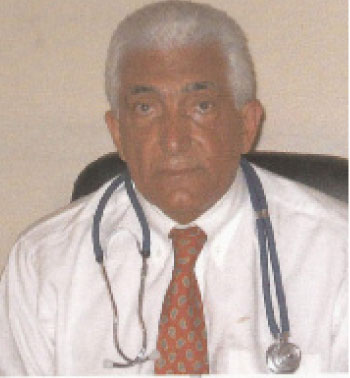
Most often, AD is diagnosed in people over 65 years of age, although the less-prevalent early-onset Alzheimer’s can occur much earlier. In 2006, there were 26.6 million sufferers worldwide. Alzheimer’s is predicted to affect 1 in 85 people globally by 2050.
Dr Hassan Azadeh, our health adviser and a senior lecturer at the University of the Gambia, who is also a senior consultant physician is this week focusing on this quite common disease called Alzheimer, explain about causes, diagnose and treatment possibilities.
Alzheimer’s disease is a fatal, progressive and degenerative disease that destroys brain cells. It is the most common form of dementia, accounting for 64 per cent of all dementia in Canada.
Alzheimer’s disease is not a normal part of aging. Symptoms include having difficulty remembering things, making decisions and performing everyday activities. These changes can affect the way a person feels and acts. There is currently no way to stop the disease, but research is improving the way we provide care and will continue to search for a cure.
Although Alzheimer’s disease develops differently for every individual, there are many common symptoms. Early symptoms are often mistakenly thought to be ‘age-related ‘concerns, or manifestations of stress. In the early stages, the most common symptom is difficulty in remembering recent events. When AD is suspected, the diagnosis is usually confirmed with tests that evaluate behavior and thinking abilities, often followed by a brain scan if available.
As the disease advances, symptoms can include confusion, irritability, aggression, mood swings, trouble with language, and long-term memory loss. As the sufferer declines they often withdraw from family and society. Gradually, bodily functions are lost, ultimately leading to death.
Since the disease is different for each individual, predicting the person is difficult. AD develops for an unknown and variable amount of time before becoming fully apparent, and it can progress diagnosed for years. On average, the life expectancy following diagnosis is approximately seven years.Fewer than three percent of individuals live more than fourteen years after diagnosis.
What causes Alzheimer’s disease?
We do not yet know what causes Alzheimer’s disease but researchers have identified risk factors associated with it.
Aging
·The most important risk factor is aging. A minimum age needs to be reached for Alzheimer’s disease to develop.People do not get the disease in their teenage years or even in their 20s. It is well-established that aging can impair the body’s self-repair mechanisms. And of course, many of the risk factors increase with age, such as blood pressure, stress, and obesity.
Genetics
·There is no doubt that genetics play a role in the disease. Yet only a small percentage of cases are associated with the specific genes that cause the inherited form of the disease. Risk genes increase the likelihood of developing a disease, but do not guarantee it will happen.
Other factors
·Research is being done on other factors such as existing diseases or conditions that the person may have, infections, toxins in the environment, education level, alcohol and tobacco use, diet and exercise.
Are there treatments for symptoms of Alzheimer’s disease?
Several medications are now available to treat some symptoms of Alzheimer’s disease. These drugs are not a cure for the disease. They do not stop its progression. Ask your doctor if there is a treatment suitable for you.
Will children get Alzheimer’s disease?
The sporadic form of Alzheimer’s disease (which used to be called “late onset Alzheimer’s disease”), was formerly assumed to have no family linkages. We now know, however, that a person with a direct relative (parent or sibling) with Alzheimer’s disease has a three times greater chance of developing the disease than someone who does not. The risk increases further if both parents have the disease. So aside from the FAD-related genes there are Alzheimer’s disease-related genetic factors shared by family members.
A very small percentage of people have an inherited form of the disease. This rare form is called familial dominant (FAD) Alzheimer’s disease. In certain families, it passes directly from one generation to another. Having more than one family member with Alzheimer’s disease does not necessarily mean that your family has the inherited form.
Is there genetic testing for Alzheimer’s disease?
Genetic testing for the disease is not widely available in Canada. It is usually limited to people with a strong family history of the disease who are enrolled in specific research studies. Some testing is also done on referral from a family physician. You cannot request genetic testing on behalf of another family member.
How does Alzheimer’s disease progress?
Alzheimer’s disease typically follows certain stages that cause changes in the person’s and family’s lives. Because the disease affects each individual differently, the symptoms, the order in which they appear and the duration of each stage vary from person to person. In most cases, the disease progresses slowly, and the symptoms of each stage may overlap, often making the move from one stage to another quite subtle. The duration of the disease is usually seven to ten years but may be much longer in some people.
What is related dementia?
·Each of the related dementia has unique aspects but all share common symptoms: gradual and ongoing decline of short- and long-term memory, changes in language abilities, mood and behavior, judgment and reasoning, making it impossible over time to perform simple tasks.
·Dementia eventually affects all aspects of a person’s life, including how the person thinks, feels, acts and reacts to his environment.
·Currently, there is no known cure for these diseases but studies show that lifestyle changes can help slow the progression of the disease.
·Researchers are confident that within seven to ten years there will be treatments that target the disease process itself, not just the symptoms.
·Dementia is commonly diagnosed in people 65 and older, but mounting evidence suggests it can begin to develop well before signs appear, as early as age 40.
As Alzheimer’s disease progresses and affects different areas of the brain, symptoms become more severe. The result is changes in abilities and/or behavior. Once ability is lost, it is not known to return, but research now suggests that some relearning may be possible.
Alzheimer’s disease and life expectancy
The main reason Alzheimer’s disease shortens people’s life expectancy is not usually the disease itself, but complications that result from it. As patients become less able to look after themselves, any illnesses they develop, such as an infection, are more likely to rapidly get worse. Caregivers will find it harder and harder to identify complications because the patient becomes progressively less able to tell if he/she is unwell, uncomfortable, or in pain. Pneumonia and pressure ulcers are examples of common complications which may lead to death for people with severe Alzheimer’s disease.
What are the causes or risk factors of Alzheimer’s Disease?
Although a great deal of research has been done and is currently being done on the possible causes of Alzheimer’s, experts are still not sure why the brain cells deteriorate. However, there are several factors which are known to be linked to a higher risk of developing the disease. These include:
Age
After the age of 65, the risk of developing Alzheimer’s doubles every five years. Although Alzheimer’s is predominantly a disease that develops during old age, some younger people may also develop the condition.
-Ages 65-74, 1 in 100
-Ages 75-84, 1 in 14
-Age over 85, 1 in 4
Family history
People who have a close family member who developed Alzheimer’s have a slightly higher risk of developing it themselves - just a slightly higher risk, not a significantly higher risk. Only about 7% of all cases are associated with genes that cause the early onset inherited familial form of the disease. Among those who do inherit the condition, it may start at an earlier age.
Gender
A higher percentage of women develop Alzheimer’s than men. As women live longer than men, and Alzheimer’s risk grows with age, this may partly explain the reason.
For further information, send email to azadehhassan@yahoo.co.uk, text to 7774469 or call Dr Azadeh’s Live Health show on Afri radio every Wednesday from 9-9.30am.



